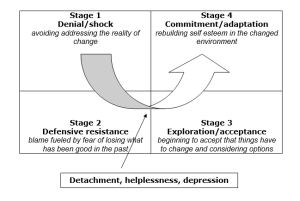Leading and Managing in Change
“The only thing that is constant is change” – not a quote from the 21st century but from Heraclitus of the Ancient Greeks.
Yet we’re still finding challenges in leading and managing people in circumstances of change – those situations when what got us to where we are now is not what will serve us well in the future.
Search the internet for ‘Change Curve’ and you’ll find lots of variations and models which describe the typical responses that people have to major change. Many of the attributions are to Elisabeth Kubler-Ross and the grief curve that she published in her 1969 book ‘On death and dying”. A later author, William Bridges, introduced the transition curve – in his 1991 book “Managing Transitions” with a 3 phase process taking people through to new beginnings. He makes the point that in change situations, people move from a present state to a future state through a transitional period.
Here’s my version of a four-stage curve – starting from the top left.
Some people grasp change with positivity and optimism – with stage 1 for them being more surprise than shock and stage 2 almost non-existent. However, for many change has a negative underpinning. This is likely to be fuelled by:
- Worry about bad things that could happen as a result – job losses, unwelcome role changes, etc
- Fear of the loss of a status quo that has stability and benefits to it – a wish to hold on to the past
- Cynicism over the reasons behind the change and whether it will be for the better
- Concern over own skills and abilities to adapt to the new situation effectively
What can you do as a manager or leader to help people through each Stage:
Stage 1 – Denial/Shock
Provide information
- Let them know the that changes will happen and when
- Explain what to expect when changes happen
- Suggest actions they can take to adjust to changes
- Communicate regularly and openly
- Give time to let things sink in then arrange sessions to talk over plans
Stage 2 – Defensive Resistance
Create opportunities for people to safely say what they think and feel
- Listen and acknowledge their feelings
- Respond empathetically and accept their response
- Don’t tell people to change or pull together or try to talk them out of their feelings
- Encourage a supportive environment and keep managers alert to those who might be detached, demotivated or disengaged
Stage 3 – Exploration/acceptance
Harness ideas, respond to feedback, plan and guide
- Encourage input of ideas and discussion
- Concentrate on priorities
- Set short term goals
- Conduct planning sessions
- Provide any training needed
- Follow up on projects that are underway
- Provide guidance where appropriate
Stage 4 – Commitment/adaptation
Reward successes and continue planning and monitoring
- Concentrate on team building around the requirements of the new environment
- Create medium-term goals and objectives to support the change
- Acknowledge and reward those responding to change
- Celebrate small wins on the way to bigger goals
- Plan for the long term future
- Anticipate and prepare for further changes
Dependent on their personality preferences people will react in different ways – some will embrace new and different readily; while others with an ‘if it ain’t broke’ mentality need convincing and a message of evolution rather than revolution may work better. Some will need time to reflect on the implications of change to them; while others will want to get into action quickly.
John Kotter’s 8-Step model for successful large scale change is also a good model to explore. In his book “The Heart of Change” he makes the point that “People change what they do less because they are given analysis that shifts their thinking than because they are shown a truth that influences their feelings.
Communication is at the root of well managed and led change – giving people clarity (even if there is uncertainty), helping them understand their role in making change happen, keeping them motivated and celebrating the wins.
_______________________________________________________________
Get in touch to find out more about coaching
If you’re interested in developing your self awareness, communication or management skills, confidence, time management or just getting focus on your goals, do get in touch to discuss. I believe everyone has the potential to improve their performance, motivation and happiness – coaching works because you become accountable to an external person who is a source of encouragement and support – as well as challenging your barriers.
Email Zoë Whitby: zoe@zwcoaching.co.uk
Call on: 07919 201128
Like my Facebook page for regular shares of interesting articles and videos click here
Subscribe to my monthly emailer on ‘Effectiveness at Work’ click here
